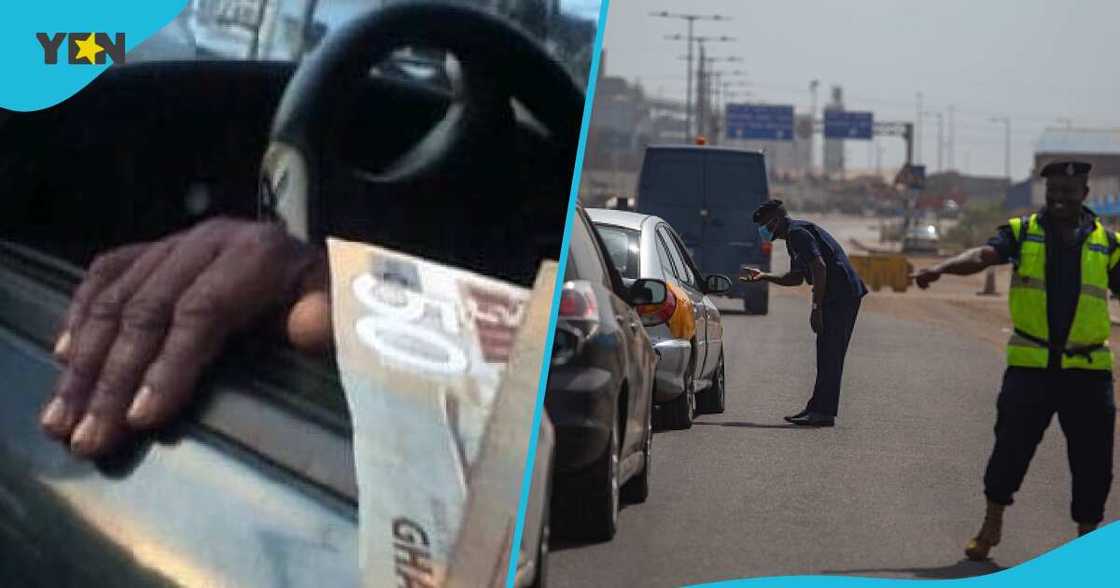UN Report On Corruption: Police Officers Top Bribe Takers In Ghana, Followed By Immigration and GRA Officers
- A UN report has found that the officers of the Ghana police service top public officers who take bribes in Ghana
- The report also found that officers of the Ghana Immigration Service and Ghana Revenue Authority follow the police
- The report that used 2021 figures also disclosed that half of the people in contact with police officers paid bribes an average of four times
A UN report on corruption in Ghana based on the experiences and views of Ghanaians has found that the prevalence of bribery is highest for police officers.
The report scored 53.2% bribery among police officers, followed by officers of the Ghana Immigration Service, who scored 37.4% and officers of the Ghana Revenue Authority (GRA), who scored 33.6%.

Read also
"What they do is harass their customers": Quick Credit officials summoned by Data Protection Commission over hounding of debtors
"Other public officials that are frequently among the three types in relation to whom the prevalence of bribery is highest across the 16 regions are officials of the Passport Agency, Ghana Immigration Service and Lands Commission Officials," the report said.

Source: UGC
How often bribes are paid to public officials
The report explained that analysis of the prevalence of bribery in Ghana shows people are more likely to pay bribes to particular types of officials.
"Bribe-payers reported paying an average of five bribes in 2021. However, that average masks large variations in the frequency of bribe payments across public officials, which range from 2.0 bribes paid to passport officers to 6.1 paid to National Road Safety Authority officials, indicating that bribe-paying in relation to certain types of public officials is highly concentrated," the reported added.
The report that used 2021 figures disclosed further that half of the people in contact with police officers in 2021 paid them bribes, and those who paid bribes did so an average of four times.
"This means that bribe-paying is not an isolated event and that those who pay bribes are likely to repeatedly pay bribes, perhaps because they routinely face situations in which bribes can be extracted from them.
"The survey data reveal, however, that although the prevalence of bribery is highest in relation to police officers, they are not the public officials who receive the highest average number of bribes. National Road Safety Authority officials are those who receive bribes most frequently bribes, with an average of 6.1 bribes received in 2021," the report added.
The report also disclosed that some GH¢5 billion was paid in bribes by Ghanaians from all walks of life to public officials.
It said the bribes were paid to speed up public service delivery to those offering the bribes.
Police need a more robust monitoring system
On the back of the conversation the report has stirred among the public, YEN.com.gh reached out to Mary Awelanah Addah, an anti-corruption campaigner at the Ghana Integrity Initiative (GII), the Ghana chapter of Transparency International.
She told YEN.com.gh that it is not strange that the police officers would top the bribing-taking public officials in Ghana.
"Police officers, by their work interact with members of the public a lot so the unethical ones among them would usually use intimidation tactics to extort money from the vulnerable, the people who lack knowledge about their rights," she said.
She said from the UN report, it is easy to link the institution ranked at the top of bribe-takers and how often they interact with the public, explaining that a lack of robust monitoring and sanctions regime has intensified the culture of corruption.

Read also
Cecilia Dapaah could be charged with illicit dealing in foreign currency - Lawyer Srem-Sai wades in
"We must not forget that even though the police are on top as those who take bribes the most, there are some public officers who don't take bribes often but the amount of money they take when they do is so huge that it does not compare to what a police officer will take for a whole month," she said.
She has asked the police administration, the GRA and the Immigration Service to institute a more robust monitoring system that will punish officers.
"We must first uproot the culture of bribe-taking and other forms of corruption that is so deep in our public institutions, so the sanctions for those who are caught must be severe to serve as deterrent," she told YEN.com.gh.
Foreign affairs minister fumes over Goro Boys cartel at passport office
Meanwhile, YEN.com.gh has reported in a separate story that the foreign affairs minister, Shirley Ayorkor Botchwey, has lamented the continued corruption at the passport office in Accra.

Read also
Over $500k in cash: Here’s how much investigators found at Cecilia Dapaah’s Abelemkpe residence
The minister has decided to relieve all staff seconded to the office as part of attempts to clean up the system.
Botchwey has also said there will be an investigation into the conduct of personnel at the passport office in Accra.
Quick Credit summoned by Data Protection Commission for hounding debtors
YEN.com.gh also reported that the Data Protection Commission has summoned officials of Quick Credit and Investment Micro-Credit Limited.
The officials were summoned over the alleged publishing of the names of defaulting customers without consent.
Officials of Mawarko Fast Food and Hisense Ghana were also picked up for questioning over possible privacy breaches.
Akufo-Addo urged to sack and reconstitute entire Economic Management Team
In other stories, former president John Mahama has backed the huge number of people calling for finance minister Ken Ofori-Atta to be sacked.
The ex-president said President Nana Akufo-Addo must not sack the minister but must reconstitute the entire economic management team.
He made the comments when he spoke at a forum to discuss Ghana's economic challenges and proffer solutions.
New feature: Сheck out news that is picked for YOU ➡️ click on “Recommended for you” and enjoy!
Source: YEN.com.gh




